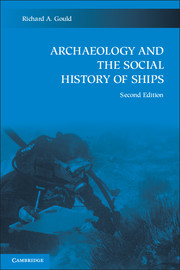Book contents
- Frontmatter
- Contents
- List of figures
- List of tables
- Acknowledgments
- Introduction: Toward a higher standard
- 1 Interpreting the underwater archaeological record
- 2 Underwater archaeology: The state of the art
- 3 Ships and shipwrecks: Basic mechanics
- 4 The archaeology of small watercraft
- 5 The earliest ships
- 6 Shipwrecks and our understanding of ancient trade
- 7 Sailing ships of the Middle Ages
- 8 Ships of the great age of sail
- 9 From sail to steam in maritime commerce
- 10 New technologies and naval warfare
- 11 The archaeology of maritime infrastructure
- 12 The future of shipwreck archaeology
- References cited
- General index
- Ship and site index
7 - Sailing ships of the Middle Ages
Published online by Cambridge University Press: 05 June 2012
- Frontmatter
- Contents
- List of figures
- List of tables
- Acknowledgments
- Introduction: Toward a higher standard
- 1 Interpreting the underwater archaeological record
- 2 Underwater archaeology: The state of the art
- 3 Ships and shipwrecks: Basic mechanics
- 4 The archaeology of small watercraft
- 5 The earliest ships
- 6 Shipwrecks and our understanding of ancient trade
- 7 Sailing ships of the Middle Ages
- 8 Ships of the great age of sail
- 9 From sail to steam in maritime commerce
- 10 New technologies and naval warfare
- 11 The archaeology of maritime infrastructure
- 12 The future of shipwreck archaeology
- References cited
- General index
- Ship and site index
Summary
Shipbuilding Traditions Under Sail
Elements of conservatism are sometimes implicit in contemporary treatments of maritime technology under sail. Although conservative adherence to shipbuilding rules and practices was undeniably present at the level of distinguishable cultural traditions such as the Vikings, there was another level within these traditions in which shipbuilders revealed their adaptability in relation to changing circumstances of commerce and conflict. Underwater archaeology has substantially increased our appreciation for this finer-grained level of analysis and has made the different maritime traditions appear less monolithic to maritime culture historians.
Sailing craft in various parts of the world today retain certain features of ancient boats and ships. For example, Greenhill and Morrison (1995: 221) suggest that, “although clinker-building for large vessels went out of use, it persisted for boats and small ships down to the end of wooden boatbuilding and remained the principal tradition in Britain and Scandinavia and parts of North America.” They go on to present a parallel case for the historical survival of a European-based flat-bottomed boatbuilding tradition founded ultimately on the Baltic cog and continuing to the modern dory, a type of boat widely used by fishermen along the northeastern coast of North America (Greenhill and Morrison, 1995: 229–240). Their argument is muddied, however, by recognition that the functional advantages of flat-bottomed boats and ships – simplicity, cheapness of construction, and suitability for operation in shallow waters and on beaches and mud flats – led to the adoption of this design in many parts of the world, and one cannot tell to what extent these claimed survivals were due to the retention and transmission of the principles of a particular cultural–historical tradition to succeeding generations or to convergent abilities within different cultural–historical traditions to adapt in similar ways to similar circumstances.
- Type
- Chapter
- Information
- Archaeology and the Social History of Ships , pp. 171 - 208Publisher: Cambridge University PressPrint publication year: 2011



